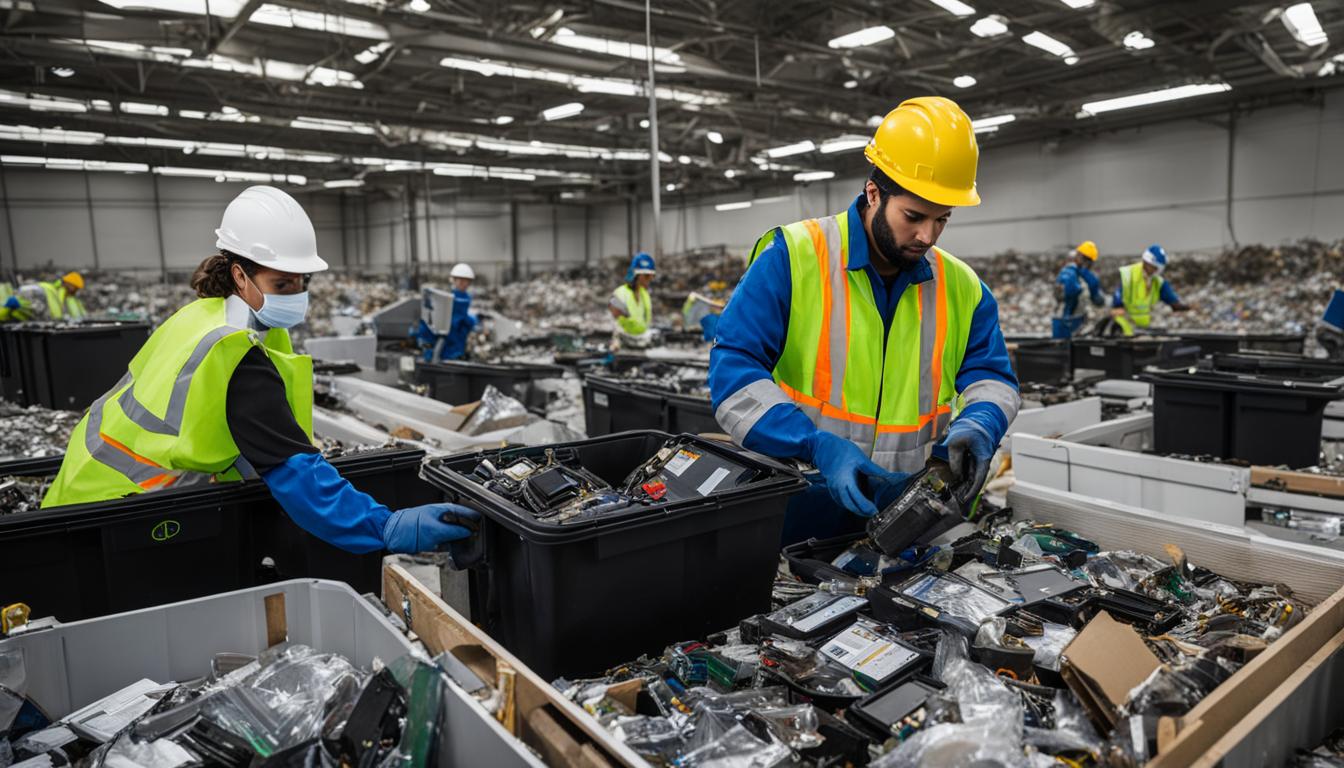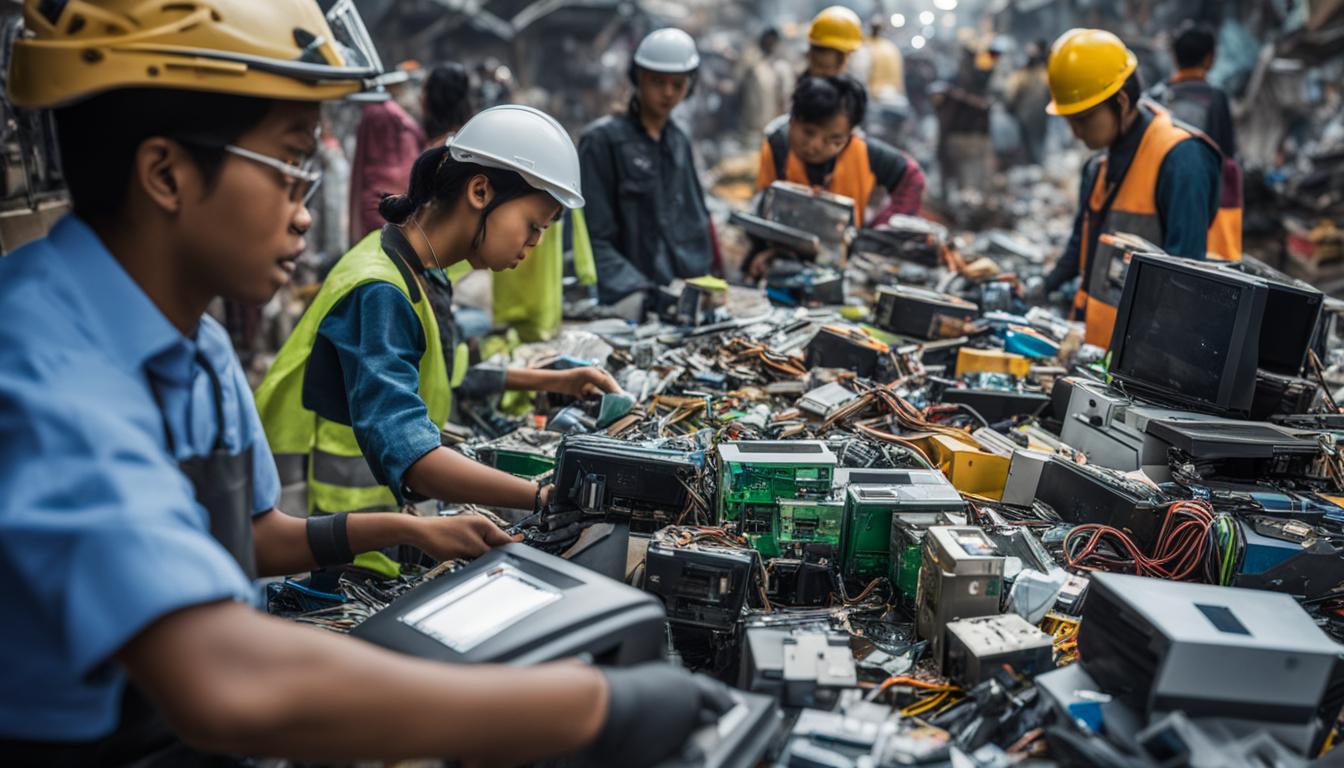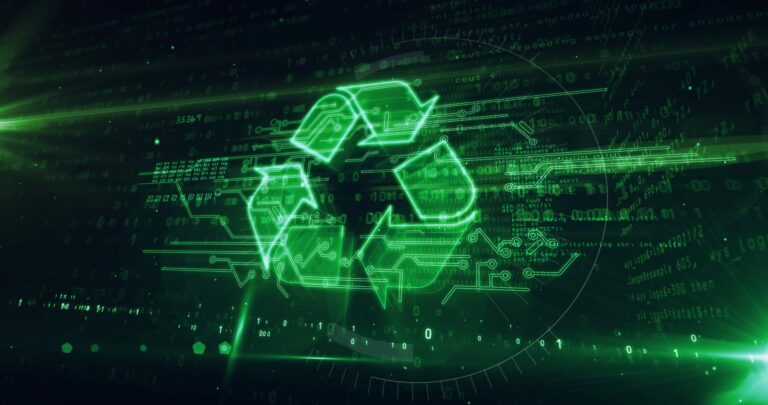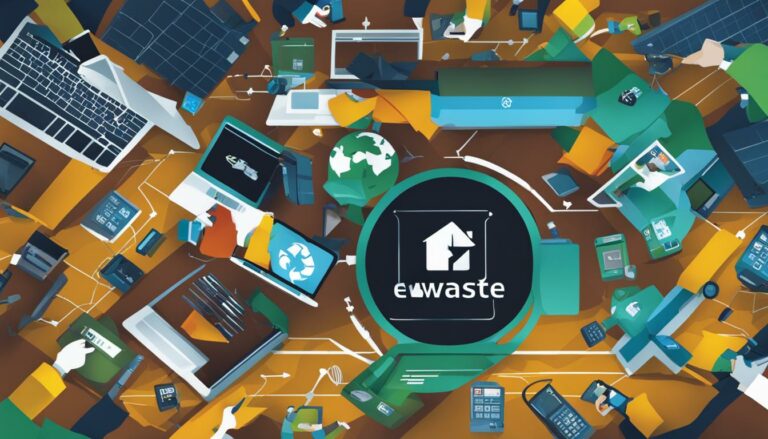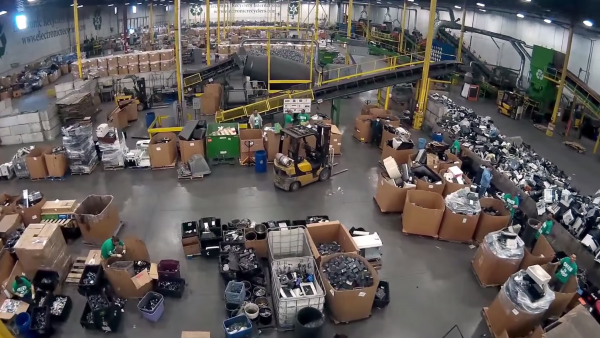The Critical Role of Policymakers in E-waste Reduction
Electronic waste, or e-waste, is becoming an increasingly pressing global issue. With 53.6 million metric tonnes generated in 2019 alone, it is clear that urgent action is needed to address this growing problem. Policymakers have a critical role to play in driving e-waste reduction efforts through the implementation of effective electronic waste management policies and the promotion of sustainable solutions.
Key Takeaways:
- Policymakers have the power to implement regulations and policies that promote sustainable e-waste management.
- Government policies should hold manufacturers and businesses accountable for their e-waste contribution.
- A shift towards more sustainable consumption practices is needed in the corporate world.
- E-waste poses significant environmental and social challenges.
- Recycling initiatives, waste management strategies, and environmental policies are essential for reducing the impact of e-waste.
The Impact of E-waste on the Environment and Society
E-waste poses significant environmental and social challenges. The UN Global E-waste Monitor reports that 1,000 laptops are thrown away every second, contributing to a growing waste stream. Current regulatory efforts have primarily focused on the responsibility of manufacturers and consumers in managing e-waste. However, policymakers must take more proactive measures to address this issue. By implementing recycling initiatives, waste management strategies, and environmental policies, policymakers can contribute to reducing the impact of e-waste on the environment and society.
The Environmental Consequences of E-waste
E-waste contains hazardous substances such as lead, mercury, and cadmium that can leach into the environment, contaminating soil, water, and air. Improper disposal and inadequate recycling processes can further exacerbate these environmental risks. The extraction and production of raw materials for electronics also contribute to deforestation, energy consumption, and greenhouse gas emissions. Policymakers need to prioritize environmental policies that promote proper e-waste disposal, enhance recycling infrastructure, and encourage sustainable production practices.
The Social Implications of E-waste
The improper management of e-waste can have severe social consequences, particularly in developing countries that receive large quantities of electronic waste. Workers in the informal sector often engage in hazardous recycling practices, exposing themselves to harmful substances without proper protective measures. These workers face health risks, including respiratory and neurological disorders. Policymakers need to address these social implications by promoting safe working conditions, providing training and support for the formalization of the recycling sector, and implementing policies that encourage responsible disposal and recycling.
| E-waste Impact | Environmental Consequences | Social Implications |
|---|---|---|
| Hazardous Substances | Contamination of soil, water, and air | Health risks for informal sector workers |
| Resource Extraction | Deforestation, energy consumption, and greenhouse gas emissions | Unsafe working conditions |
| Improper Disposal | Environmental pollution | Insufficient recycling infrastructure |
“The increasing volume of e-waste puts immense pressure on our environment and society. It is imperative for policymakers to take proactive measures to address this issue and reduce its impact. By implementing recycling initiatives, waste management strategies, and environmental policies, we can pave the way towards a more sustainable future.” – Environmental Expert
The Role of Government Regulations in E-waste Management
Government regulations play a vital role in ensuring effective e-waste management. These regulations are essential for holding manufacturers accountable for their e-waste contribution and promoting sustainable waste management policies. In the United Kingdom, the government’s ‘Electronic Waste and the Circular Economy’ report recommends ambitious long-term targets for e-waste collection, re-use, and recycling. This proactive approach sets an example for other countries to follow in their efforts to combat the growing e-waste crisis.
European lawmakers have also proposed mandatory targets as part of the EU’s circular economy action plan. These targets aim to reduce e-waste and promote a more sustainable approach to electronic waste management. In addition to collection and recycling targets, there are also discussions surrounding Right to Repair laws and the introduction of a Repairability Index. These measures are crucial in promoting reuse and reducing e-waste generation.
Government regulations must continue to evolve and adapt to the changing landscape of electronic waste. Standardizing parts, encouraging alternative consumption models, and improving accountability for e-waste disposal are key areas that need further attention. By implementing comprehensive regulations, policymakers can ensure that e-waste is managed in an environmentally responsible manner, minimizing its impact on the environment and society.
| Benefits of Government Regulations in E-waste Management | Examples |
|---|---|
| Promoting sustainability | UK’s ‘Electronic Waste and the Circular Economy’ report |
| Reducing e-waste generation | Mandatory targets proposed by European lawmakers |
| Encouraging reuse | Discussion of Right to Repair laws and Repairability Index |
| Improving accountability | Ensuring proper disposal and minimizing environmental impact |
The Importance of Education and Collaboration in E-waste Reduction
Educating the public and fostering collaboration are crucial elements in reducing e-waste. Policymakers have a vital role to play in promoting waste management strategies, recycling initiatives, and sustainable waste management policies among businesses and individuals. By raising awareness about the impact of e-waste on the environment and society, policymakers can encourage behavioral changes that lead to reduced e-waste generation and proper disposal.
One effective way to educate the public is through informational campaigns that highlight the environmental consequences of improper e-waste management. These campaigns can emphasize the importance of recycling electronic devices, encouraging individuals to dispose of their old devices at designated collection points or participate in e-waste recycling programs. Additionally, policymakers can provide resources and guidelines for businesses to implement responsible e-waste management practices, such as partnering with certified recyclers or refurbishing and reselling electronic devices.
Collaboration between policymakers, businesses, and the public is essential in developing comprehensive e-waste reduction strategies. Policymakers can foster partnerships with organizations and industry leaders to share best practices and establish industry-wide standards. By working together, stakeholders can identify innovative solutions, such as extended producer responsibility programs or product stewardship initiatives, that promote sustainable consumption and reduce waste.

The Economic Benefits of E-waste Reduction
E-waste reduction strategies implemented by policymakers have not only positive environmental and societal impacts but also significant economic benefits. According to Accenture, adopting a circular economy approach to e-waste could unlock an estimated $4.5 trillion in economic benefits by 2030. This transformative change towards a greener economy has the potential to boost GDP and create new job opportunities, driving economic growth.
Companies that prioritize environmental, social, and corporate governance (ESG) practices have been shown to outperform those that do not. This indicates that sustainable waste management, including the reduction of e-waste, can have a positive effect on a company’s financial performance. Policymakers play a crucial role in realizing these economic advantages by implementing effective strategies and regulations that encourage businesses to adopt sustainable practices, such as responsible e-waste disposal and extended product lifecycles.
“Adopting a circular economy approach to e-waste could uncover $4.5 trillion in economic benefits by 2030.” – Accenture
The Economic Advantages of E-waste Reduction
Reducing e-waste not only promotes a sustainable future but also offers economic opportunities. Policymakers must recognize the potential for economic growth and job creation in implementing effective e-waste reduction strategies. By prioritizing sustainable waste management practices and promoting corporate responsibility, policymakers can drive positive change and unlock the economic benefits associated with e-waste reduction.
| Benefits of E-waste Reduction | Impact |
|---|---|
| Job Creation | Reduction of unemployment rates through the development of recycling and refurbishing industries. |
| Resource Conservation | Preservation of valuable resources such as metals, rare earth elements, and precious metals. |
| Cost Savings | Reduced costs associated with energy consumption, raw material extraction, and waste management. |
| Positive Environmental Impact | Reduction of greenhouse gas emissions, pollution, and environmental degradation. |
The Complexities of E-waste Management in Emerging Economies
E-waste management in emerging economies presents a unique set of challenges that policymakers must address. Countries such as China, India, and South Africa face the dual pressures of rapid economic growth and the importation of cheap electronic devices. As a result, they have become major recipients of e-waste. The informal sector plays a significant role in e-waste collection and recycling in these countries, necessitating the inclusion of their perspectives and needs in policy-making processes.
Accurate estimation of e-waste generation is crucial in developing effective waste management strategies. In emerging economies, where informal recycling practices are prevalent, collaboration between the formal and informal sectors is essential. By working together, they can establish sustainable methods for e-waste collection, recycling, and disposal. This collaboration also allows for the sharing of best practices and the development of innovative solutions to address the e-waste crisis.
Public awareness and education play a vital role in tackling e-waste management challenges in emerging economies. Governments must prioritize initiatives that educate the public about the environmental and health risks associated with improper e-waste disposal. Additionally, policymakers can empower local communities by providing training and resources for safe e-waste handling and recycling. By involving the public in e-waste management efforts, policymakers can foster a sense of collective responsibility and encourage sustainable practices.
Key Challenges in E-waste Management in Emerging Economies
- Lack of accurate data on e-waste generation and disposal practices
- Inadequate infrastructure for proper e-waste collection, recycling, and disposal
- Reliance on informal sector for e-waste management, leading to health and environmental risks
- Limited public awareness and education on the importance of proper e-waste disposal
- Need for collaboration between formal and informal sectors to develop sustainable e-waste management strategies
Addressing these challenges requires comprehensive and context-specific electronic waste management policies. Governments in emerging economies should prioritize the development and implementation of regulations that promote sustainable waste management practices. By adopting a holistic approach that considers the needs and perspectives of all stakeholders, policymakers can effectively manage e-waste and minimize its impact on both the environment and society.

| E-waste Management Challenges in Emerging Economies | Proposed Solutions |
|---|---|
| Lack of accurate data on e-waste generation and disposal practices | Invest in research and data collection to accurately assess the scale of e-waste problem, and monitor progress towards waste reduction goals |
| Inadequate infrastructure for proper e-waste collection, recycling, and disposal | Invest in the development of e-waste recycling facilities and collection systems, and provide necessary resources and training for proper waste management |
| Reliance on informal sector for e-waste management, leading to health and environmental risks | Formalize the informal sector through capacity building programs, training, and regulation, while promoting safe and sustainable e-waste management practices |
| Limited public awareness and education on the importance of proper e-waste disposal | Launch public awareness campaigns and educational programs to inform the public about the environmental and health impacts of improper e-waste disposal, and promote responsible e-waste management |
| Need for collaboration between formal and informal sectors to develop sustainable e-waste management strategies | Foster collaboration between formal and informal sectors through public-private partnerships, knowledge sharing, and capacity building initiatives |
Conclusion
Policymakers play a critical role in promoting sustainable e-waste solutions. By implementing effective policies, regulations, and waste management strategies, policymakers can reduce the impact of e-waste on the environment and society. Collaboration between government, businesses, and the public is essential for successful e-waste reduction. The economic benefits of e-waste reduction further motivate policymakers to prioritize this issue.
It is crucial for emerging economies to address the complexities of e-waste management and involve the perspectives of informal actors. Accurate estimation of e-waste generation, collaboration between formal and informal sectors, and public awareness are crucial in addressing the e-waste crisis in these countries. With concerted efforts from policymakers and stakeholders, effective e-waste management can be achieved.
In conclusion, policymakers play a crucial role in driving sustainable e-waste solutions. Their actions can shape regulations, implement recycling initiatives, and promote collaboration for effective waste management. By addressing the complexities of e-waste management and recognizing the economic benefits, policymakers have the power to make a positive impact on the environment, society, and the economy.
FAQ
What is e-waste?
E-waste, or electronic waste, refers to discarded electronic devices such as laptops, smartphones, and televisions.
Why is e-waste a problem?
E-waste is the fastest-growing waste stream globally and can have significant environmental and social impacts if not managed properly.
What role do policymakers play in e-waste reduction?
Policymakers have the power to implement regulations and policies that promote sustainable e-waste management practices.
How can government regulations help in effective e-waste management?
Government regulations can require manufacturers to take responsibility for their e-waste contribution, set targets for e-waste collection and recycling, and promote reuse through Right to Repair laws and Repairability Index.
What is the economic benefit of e-waste reduction?
A circular economy approach to e-waste could unlock $4.5 trillion in economic benefits by 2030 and create jobs, boosting GDP.
What challenges does e-waste management pose in emerging economies?
Emerging economies face unique challenges due to rapid economic growth, importation of cheap electronic devices, and the involvement of the informal sector in e-waste collection and recycling.
How can collaboration between different sectors contribute to e-waste reduction?
Collaboration between government, businesses, and the public is essential for developing waste management strategies, recycling initiatives, and promoting better accountability for e-waste disposal.


